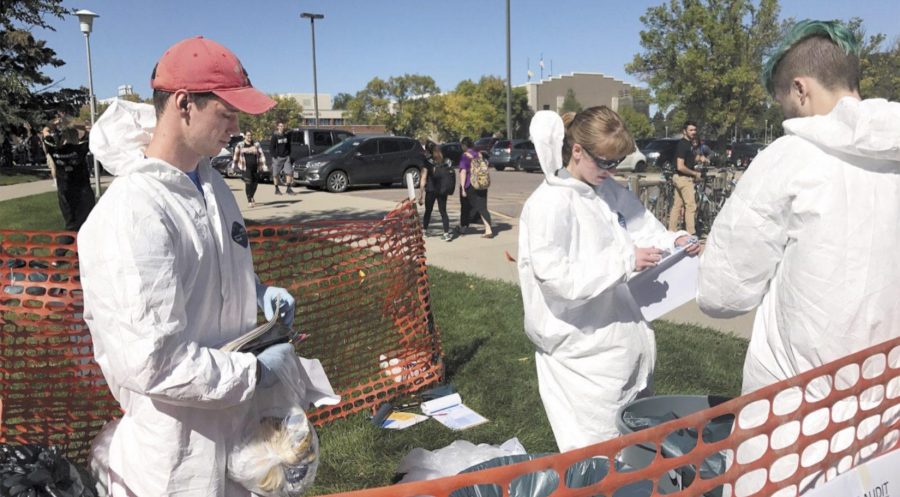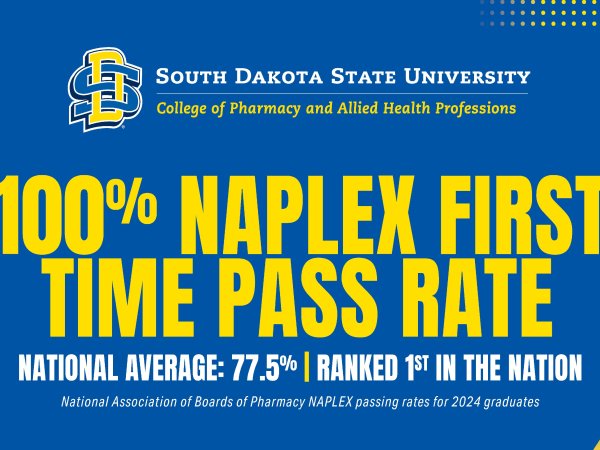SDSU’s campus is becoming more sustainable all the time and several strides have been made in this academic year alone to focus on sustainability.
Campus Sustainability Specialist Jennifer McLaughlin has set many goals to improve SDSU’s sustainability and has seen marked improvement across several of her focus areas, especially recycling.
This academic year saw the implementation of recycling bins in all offices across campus in January. Additionally, outdoor recycling bins are being added throughout campus, and students can expect to see recycling bins in every residence hall room this fall. McLaughlin plans to launch an educational campaign about how to use these bins so students can learn to recycle effectively.
Her goal for single-stream recycling rates on campus was to reach 25 percent by the end of June 2018. Single-stream recycling is items placed in the common blue recycling bins around campus, so this does not include recycling things like toner, ink and scrap metal.
In November 2017, the waste audit McLaughlin conducted found the single-stream recycling rate was at 13.25 percent. By February, it jumped to 16.5 percent after offices began receiving their blue bins. As of April, SDSU’s single-stream recycling rate has reached 20 percent.
“It’s been really exciting to see the single stream increase,” McLaughlin said. “I’m hopeful we can reach that 25 percent by the end of this fiscal year [June]. I think between single stream and miscellaneous recycling on campus we can get there.”
The next waste audit will be conducted April 18 and give a better understanding of recycling rates and how effectively campus is recycling the correct materials and not throwing away things that could be recycled.
In the fall, McLaughlin said one of the most common non-recyclable items in bins are coffee cups. Though they are made of paper, the waxy substance on the inside makes them non-recyclable.
McLaughlin has also assisted in getting locations for toner and book recycling on campus. There are three locations for each of these. There’s a drop-off for both toner and books in the Rotunda Breezeway. For books, the other locations are in The Union and Larson Commons. For toner there are drop offs in AME 120 and Daktronics Engineering Hall 157.
Students have also been working to make SDSU more sustainable. Students’ Association 2017-18 Finance Chair Scott Simons spearheaded an effort to ban the use of Styrofoam products in food and dining on campus. SA passed a resolution showing their support of a ban of Styrofoam containers on campus two weeks ago.
Simons worked with Aramark to discontinue the use of Styrofoam to-go containers in the Market and at Panda Express. He said they also tried to get rid of the Styrofoam cups at Chick-fil-A, however, the company is contractually obligated to use those cups.
While Styrofoam is an effective and affordable insulator and conductor, Simons said its use in food and dining contributes to a large portion of waste in landfills and felt it was one way to help reduce environmental impact.
“It’s super important to improve the space you’re in to leave it better for next generations,” Simons said. “This is a simple thing everyone can do to help the environment. Sustainability can seem like a hassle but this is one easy step.”
The Student Sustainability Council has focused on educating campus on living sustainably this year through workshops and presentations on what can and can’t be recycled, according to junior dietetics major and SSC’s vice president Anna Barr.
This spring, the council has focused on coordinating the first ever “Big Event,” a one-day community-wide volunteer event. Volunteers will help a wide variety of organizations and businesses in the community, including things like planting a garden at Dakota Prairie.
In the future, Barr hopes to get plastic bag returns at the C-Store, and as a larger project, SSC has looked into composting. Though it’s a big project and will take time, Barr said it’s achievable.
Simons plans to continue reducing the use of Styrofoam on campus and SA President Allyson Monson expects there will be more environmentally-conscious action taken by SA in the future.
“Bike share programs are a common theme seen around the table with this new body as big goals,” Monson said. “I think there are so many senators who are passionate about this and want to be more sustainable.”



















